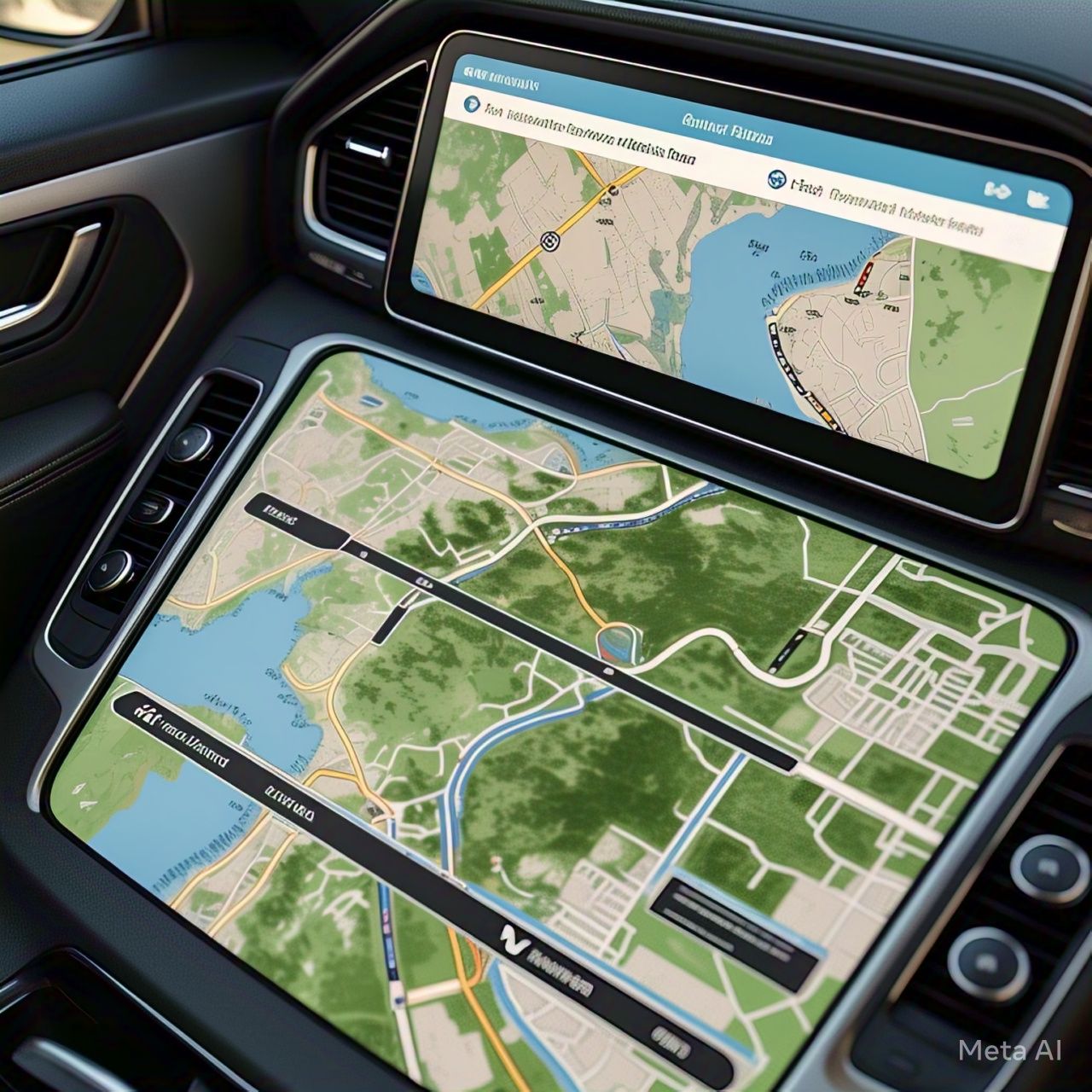Table of Contents
- Introduction
- How AI Works in Car Navigation Systems
- Key Technologies Behind AI-Powered Navigation
- Benefits of AI in Car Navigation
- Challenges and Limitations of AI Navigation Systems
- Real-World Applications of AI-Powered Navigation
- Future of AI in Car Navigation
- Conclusion
- FAQs
Introduction
Car navigation has come a long way from paper maps to AI-powered GPS systems that provide real-time traffic updates, suggest alternative routes, and even predict congestion before it happens. With millions of vehicles on the road, AI-driven navigation systems help drivers find the fastest and most efficient routes instantly, reducing travel time and fuel consumption. In this article, we explore how AI is revolutionizing car navigation and making road travel smarter.
How AI Works in Car Navigation Systems
AI-powered navigation systems utilize vast amounts of data from various sources to determine the best possible routes. These systems work by:
- Analyzing real-time traffic conditions
- Learning from historical traffic patterns
- Using predictive algorithms to forecast congestion
- Integrating user preferences and driving habits
- Adapting to unexpected road conditions like accidents and roadblocks
By constantly updating and improving, AI-driven navigation provides more accurate and efficient route suggestions compared to traditional GPS systems.
Key Technologies Behind AI-Powered Navigation
AI-powered navigation systems rely on a combination of advanced technologies, including:
1. Machine Learning (ML) Algorithms
- ML models analyze past and real-time traffic data to make intelligent routing decisions.
2. Big Data Analytics
- AI processes vast amounts of data from satellite imagery, sensors, and user inputs to find optimal routes.
3. Computer Vision
- AI-powered cameras detect road conditions, traffic signs, and pedestrian movement to assist in navigation.
4. Internet of Things (IoT)
- Connected vehicles and smart infrastructure provide continuous data updates for accurate navigation.
5. 5G and Cloud Computing
- Faster data transfer enables AI systems to process and deliver real-time route updates with minimal latency.
Benefits of AI in Car Navigation
AI-driven navigation systems provide numerous advantages, including:
1. Faster Route Optimization
- AI calculates the quickest and most efficient routes based on real-time data, reducing travel time.
2. Real-Time Traffic Updates
- AI can instantly detect accidents, road closures, and congestion, offering alternative routes.
3. Reduced Fuel Consumption
- Efficient routing helps drivers save fuel and lower carbon emissions.
4. Enhanced Safety
- AI-powered alerts notify drivers of potential hazards, such as sudden traffic stops or pedestrian crossings.
5. Personalized Navigation
- AI learns from user behavior, offering route suggestions based on individual driving patterns.
6. Seamless Integration with Smart Vehicles
- AI navigation is integrated into autonomous and connected vehicles for a smoother driving experience.
Challenges and Limitations of AI Navigation Systems
Despite its benefits, AI-powered car navigation faces several challenges:
1. Data Privacy Concerns
- AI systems collect vast amounts of user data, raising concerns about privacy and data security.
2. Dependence on Network Connectivity
- AI navigation relies on real-time data, making it less effective in areas with weak internet coverage.
3. High Implementation Costs
- Advanced AI-driven navigation systems require significant investment in technology and infrastructure.
4. Inaccurate or Outdated Data
- AI predictions can be affected by incomplete or outdated information, leading to suboptimal routing decisions.
Real-World Applications of AI-Powered Navigation
Several tech giants and automotive companies are integrating AI into their navigation systems:
1. Google Maps
- Uses AI to predict traffic conditions, suggest alternative routes, and integrate user-generated reports.
2. Waze
- AI-powered navigation app that crowdsources real-time traffic and road incident reports.
3. Tesla Autopilot
- Utilizes AI for real-time route planning and autonomous driving assistance.
4. Apple Maps
- Incorporates AI and machine learning to improve navigation accuracy and suggest alternative paths.
5. Uber and Lyft
- AI-driven route optimization helps drivers and passengers reach destinations faster.
Future of AI in Car Navigation
The future of AI-powered car navigation looks promising with advancements in:
1. Fully Autonomous Navigation
- AI will enable self-driving cars to navigate without human intervention, making travel safer and more efficient.
2. AI-Powered Voice Assistants
- Advanced AI assistants will provide natural language navigation and real-time recommendations.
3. Hyper-Personalized Navigation
- AI will learn individual driving habits and preferences to offer highly customized route suggestions.
4. Integration with Smart Cities
- AI navigation systems will communicate with smart city infrastructure to optimize traffic flow.
Conclusion
AI-powered car navigation is transforming how we travel, offering faster routes, real-time traffic updates, and safer driving experiences. As AI technology continues to evolve, navigation systems will become even more accurate, personalized, and integrated with autonomous vehicles. While challenges like data privacy and network dependency persist, the benefits of AI in car navigation far outweigh the drawbacks, making it a crucial innovation for modern transportation.
FAQs
1. How does AI improve car navigation?
AI analyzes real-time and historical traffic data to suggest the fastest and most efficient routes instantly.
2. What are the key technologies behind AI-powered navigation?
AI navigation relies on machine learning, big data analytics, IoT, computer vision, and cloud computing.
3. Can AI-powered navigation work without an internet connection?
While some features may function offline, AI navigation relies heavily on real-time data, requiring internet connectivity for optimal performance.
4. How does AI help reduce fuel consumption?
AI finds the shortest and least congested routes, minimizing idle time and fuel wastage.
5. Are AI-powered navigation systems safe?
Yes, AI enhances road safety by predicting hazards, providing real-time alerts, and optimizing driving routes.
Table: Benefits of AI in Car Navigation
| Benefit | Description |
|---|---|
| Faster Route Optimization | AI calculates the best route instantly, reducing travel time. |
| Real-Time Traffic Updates | AI detects accidents and congestion, suggesting alternative routes. |
| Lower Fuel Consumption | AI-driven routing helps save fuel and reduce emissions. |
| Enhanced Road Safety | AI alerts drivers to hazards and potential dangers. |
| Personalized Navigation | AI adapts to user preferences for a better experience. |
| Smart Vehicle Integration | AI seamlessly integrates with autonomous and connected vehicles. |
Citations:
- Johnson, M. (2023). AI and the Future of Navigation Systems. Transportation Tech Journal.
- Patel, R. (2022). How AI is Transforming GPS and Navigation. Smart Mobility Reports.
- Chang, S. (2023). Machine Learning in Traffic Management and Navigation. AI & Transportation Review.




